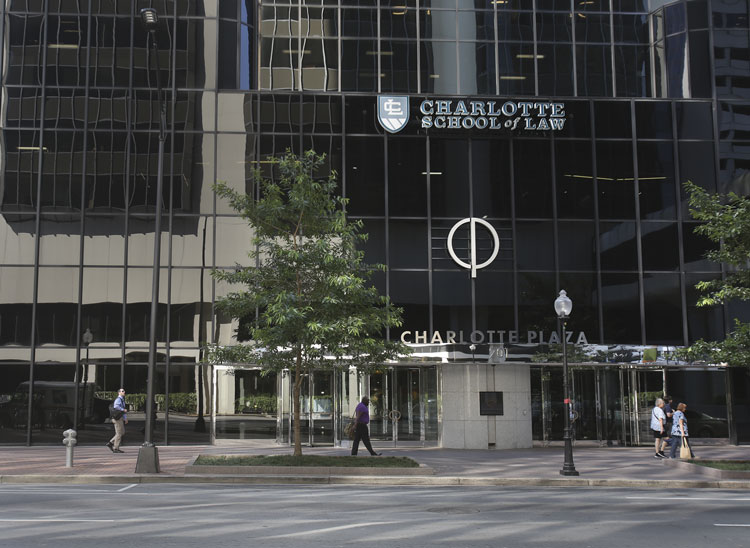ABA should never have accredited now-closed Charlotte School of Law, lawsuit claims

Charlotte School of Law. ABA Journal file photo by Albert Dickson.
A former professor and former student from the Charlotte School of Law have sued the ABA, accusing it of negligence in accrediting the school.
Charlotte graduate Ese Love and former professor Barbara Bernier say the ABA Section of Legal Education and Admissions to the Bar knew or should have known the school was not complying with accreditation standards, the complaint in U.S. ex rel Bernier v. Infilaw says. The ABA’s imprimatur misled students like Love and teachers like Bernier into joining a school that was focused more on profit than legal education, they argue.
“In short, InfiLaw and CSOL were motivated by profits, not students,” the suit said. “The ABA, in failing to enforce and ensure that CSOL was in compliance with the Standards, failed to act as a reasonable accreditor.”
The ABA has a policy against commenting on pending litigation.
The Charlotte School of Law closed last year after losing its state license amid accusations that it was not complying with basic admissions standards as well as federal student aid laws. It is part of InfiLaw, a consortium of for-profit law schools owned almost entirely by private equity company Sterling Partners. Bernier and Love’s amended complaint alleges that InfiLaw and the Charlotte School of Law intentionally admitted students with bad grades and low or no LSAT scores, in order to maximize the number of people paying tuition as high as $41,000 a year (in 2015).
See also: Florida Coastal sues ABA over finding of noncompliance with accreditation standards
When those students were ready and registered to take the bar exam, the suit alleges, they were discouraged and sometimes paid to skip the exam if the school thought they would fail. This permitted them to be counted as “second-time” test-takers when they did take the bar, preventing their scores from being reported, the lawsuit says. The school also hired graduates for meaningless jobs to artificially increase employment rates, the plaintiffs allege.
The ABA’s accreditation helped in that scheme, the complaint says, by making it legally possible for Charlotte students to take out federal student loans. This defrauded the federal government, the lawsuit says, because ABA accreditation is required for participation in the loan program. The ABA knew or should have known the school was not in compliance with accreditation standards, the complaint says, and it repeatedly ignored signs of noncompliance. The lawsuit also alleges that Charlotte School of Law and InfiLaw knowingly defrauded the federal government by failing to disclose its noncompliance with federal student loan laws.
As a result, it says, plaintiff Love has more than $350,000 in student loan debt from a discredited school; plaintiff Bernier left a tenured professorship at a different, accredited law school for a position at Charlotte School of Law. Plaintiffs estimate that most graduates have more than $238,000 in debt.
The amended complaint was filed May 8 after some claims in the original lawsuit were dismissed. Bernier filed the case in 2016 as a whistleblower lawsuit under the False Claims Act, which forbids defrauding the federal government. The government declined to intervene in August, the same month that the Charlotte School of Law closed over its lack of a state license. The ABA pulled its accreditation in February. Multiple former students are suing the school separately.
Hat Tip: Law360.



